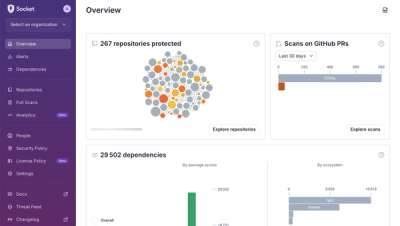
Product
A New Overview in our Dashboard
We redesigned Socket's first logged-in page to display rich and insightful visualizations about your repositories protected against supply chain threats.
Multiplex multiple message oriented protocols over a stream
npm install protomux
const Protomux = require('protomux')
const c = require('compact-encoding')
// By framed stream, it has be a stream that preserves the messages, ie something that length prefixes
// like @hyperswarm/secret-stream
const mux = new Protomux(aStreamThatFrames)
// Now add some protocol channels
const cool = mux.createChannel({
protocol: 'cool-protocol',
id: Buffer.from('optional binary id'),
onopen () {
console.log('the other side opened this protocol!')
},
onclose () {
console.log('either side closed the protocol')
}
})
// And add some messages
const one = cool.addMessage({
encoding: c.string,
onmessage (m) {
console.log('recv message (1)', m)
}
})
const two = cool.addMessage({
encoding: c.bool,
onmessage (m) {
console.log('recv message (2)', m)
}
})
// open the channel
cool.open()
// And send some data
one.send('a string')
two.send(true)
mux = new Protomux(stream, [options])Make a new instance. stream should be a framed stream, preserving the messages written.
Options include:
{
// Called when the muxer wants to allocate a message that is written, defaults to Buffer.allocUnsafe.
alloc (size) {}
}
mux = Protomux.from(stream | muxer, [options])Helper to accept either an existing muxer instance or a stream (which creates a new one).
const channel = mux.createChannel(opts)Add a new protocol channel.
Options include:
{
// Used to match the protocol
protocol: 'name of the protocol',
// Optional additional binary id to identify this channel
id: buffer,
// Optional encoding for a handshake
handshake: encoding,
// Optional array of messages types you want to send/receive.
messages: [],
// Called when the remote side adds this protocol.
// Errors here are caught and forwared to stream.destroy
async onopen (handshake) {},
// Called when the channel closes - ie the remote side closes or rejects this protocol or we closed it.
// Errors here are caught and forwared to stream.destroy
async onclose () {},
// Called after onclose when all pending promises has resolved.
async ondestroy () {}
}
Sessions are paired based on a queue, so the first remote channel with the same protocol and id.
NOTE: mux.createChannel returns null if the channel should not be opened, ie it's a duplicate channel or the remote has already closed this one.
If you want multiple sessions with the same protocol and id, set unique: false as an option.
const opened = mux.opened({ protocol, id })Boolean that indicates if the channel is opened.
mux.pair({ protocol, id }, callback)Register a callback to be called everytime a new channel is requested.
mux.unpair({ protocol, id })Unregisters the pair callback.
channel.open([handshake])Open the channel.
const m = channel.addMessage(opts)Add/register a message type for a certain encoding. Options include:
{
// compact-encoding specifying how to encode/decode this message
encoding: c.binary,
// Called when the remote side sends a message.
// Errors here are caught and forwared to stream.destroy
async onmessage (message) { }
}
m.send(data)Send a message.
m.onmessageFunction that is called when a message arrives.
m.encodingThe encoding for this message.
channel.close()Closes the protocol channel.
channel.cork()Corking the protocol channel, makes it buffer messages and send them all in a batch when it uncorks.
channel.uncork()Uncork and send the batch.
mux.cork()Same as channel.cork but on the muxer instance.
mux.uncork()Same as channel.uncork but on the muxer instance.
for (const channel of muxer) { ... }The muxer instance is iterable, so you can iterate over all the channels.
mux.isIdle()Convenience method that returns true if the number of channels is currently 0.
MIT
FAQs
Multiplex multiple message oriented protocols over a stream
The npm package protomux receives a total of 0 weekly downloads. As such, protomux popularity was classified as not popular.
We found that protomux demonstrated a healthy version release cadence and project activity because the last version was released less than a year ago. It has 0 open source maintainers collaborating on the project.
Did you know?

Socket for GitHub automatically highlights issues in each pull request and monitors the health of all your open source dependencies. Discover the contents of your packages and block harmful activity before you install or update your dependencies.

Product
We redesigned Socket's first logged-in page to display rich and insightful visualizations about your repositories protected against supply chain threats.

Product
Automatically fix and test dependency updates with socket fix—a new CLI tool that turns CVE alerts into safe, automated upgrades.

Security News
CISA denies CVE funding issues amid backlash over a new CVE foundation formed by board members, raising concerns about transparency and program governance.